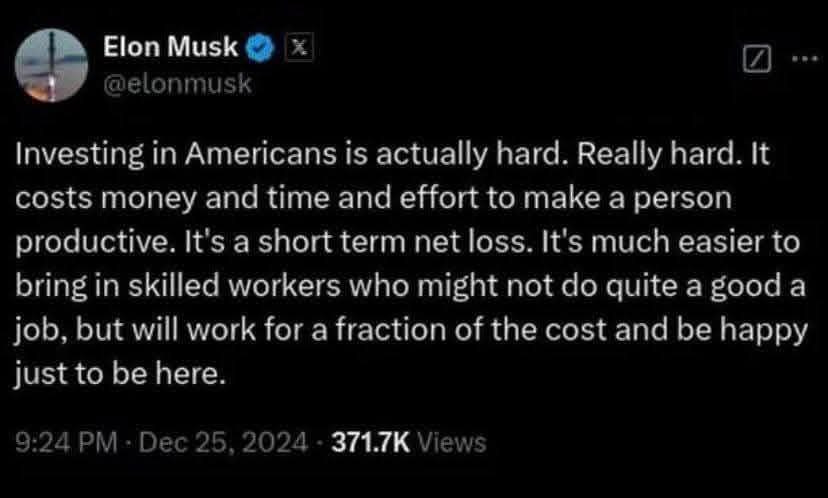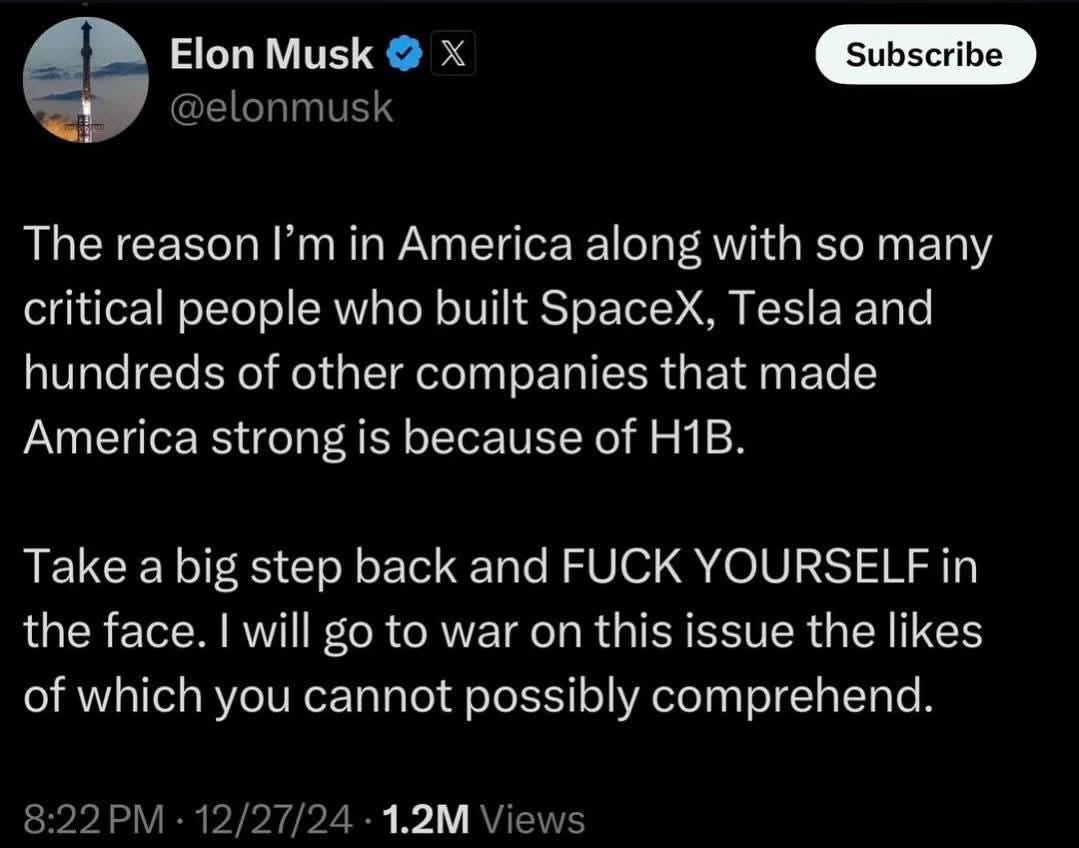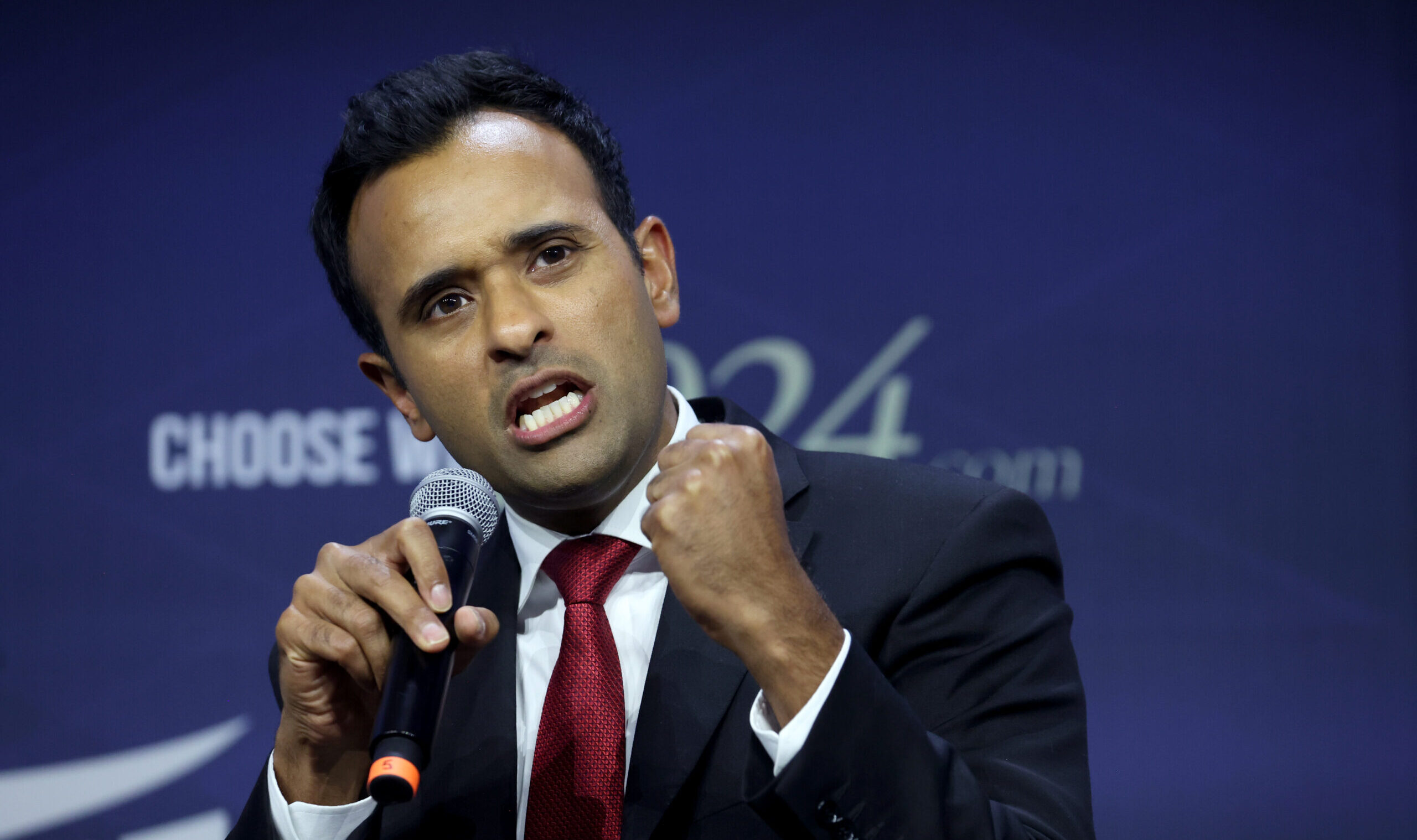Rose Sybil critiques Elon Musk’s rigid stance on H1B visas as emblematic of the technocratic worldview’s failure to integrate short-term innovation with long-term ethnocultural and foundational priorities, urging a shift towards leadership grounded in legacy and balanced growth.
Recently, Elon Musk has adopted an extreme stance on the H1B visa program, which serves as a perfect lens to explore deeper issues with the modern technocratic worldview. Musk exhibits a lack of legacy-focused thinking for the nation, viewing it instead as a machine designed to drive industry without considering its essential ethnocultural foundations. He projects his circumstances onto all H1B workers, unable to distinguish his own exceptionalism from others, which leads him to see the H1B issue in an overly simplistic, all-or-nothing manner, his opposition reflecting a mirror image stance on H1B to his own. Musk’s arguments are premised on a top-down power structure disconnected from the foundations upon which it rests. As seen with India, such an approach inevitably harms the best by percentages. The solution to this issue lies in shifting our worldview to encompass an understanding of Ellul’s concept of Technique, which gives the terminology needed to complete my theories on Archeofoundationism.

This post above highlights the central problem with scientism itself: it is shortsighted and driven by immediate economic competition. There is little remaining sense of wonder or a desire to explore the unknown simply for discovery or to broaden our understanding of reality. Instead, scientific progress is often constrained by the need to deliver immediate returns to investors or those competing with them (communism still exists within the same meta-zeitgeist of what it claimed to oppose). Even our best scientists face constant pressures to produce results quickly, which creates the illusion of power — using technology rapidly is often mistaken for truly understanding it. In this rush, we lose sight of the larger picture and fail to consider how these technologies, when used in isolation, integrate into the broader fabric of reality. This mentality leads us to believe we can bend reality to our will simply because the timeline is short, yet it ignores the wisdom needed to integrate the unknown unknowns for long-term growth, as I explore in this article.
At its core, the scientistic worldview lacks the integrative understanding necessary to achieve lasting power. It favors short-term gains and tricks that ultimately lead to disaster. This mentality is evident in Musk’s stance on the H1B program. Yes, there may be short-term costs to investing in future generations, but people are not interchangeable parts. By neglecting the disenfranchised potential within our nation, we risk its destruction and the rapid increase of dysgenics on a global scale, something Musk claims to oppose in isolation of stance but has not been able to weave into an integrative worldview and methodology of thinking. Some may dismiss the concept of dysgenics, especially those who reject Darwinian theory as much as those who believe in genetic determinism. However, this view oversimplifies complex processes. Opposing the concepts of DNA, which I see as a residue rather than causal, and Darwin’s theories, which lack an integrative approach, do not wholesale discredit the ability to see that organisms decay over time, the physical in tandem with the spiritual. Not all people have equal potential, nor do their offspring.
I do not want this to become a qualitative debate of whether Musk’s valuation holds merit, but a response to him within his valuation framework. When discussing the potential of different races in technological innovation, there is no denying that White Aryans have historically outpaced all others. They have driven major leaps in technology. However, the ability to uphold existing systems is not the same as the ability to pioneer new ones. Asians and Indians are just as capable of working within our framework. Failing to nurture the next generation of pioneers will have a selective effect against those lines by bringing in others to rule over them. Those trained to maintain systems created by others can still contribute to broadening those systems, but they need to be of the same stock that innovates. Repetitive forms of intelligence, as seen in purely quantitative measures, should not be equated with creative, innovative thought. Musk, though a brilliant mind himself, is blinded by a purely nurture perspective, which leads him to overlook the squandered potential of Americans, so he doesn’t recognize the long term importance of investing in them or the inverse relationship between individual potential and selective pressures on a macro scale. Those who argue against him for genetic determinism often ignore the crucial role of environment in realizing the full actualization of individuals with greater genetic potential. Ironically, many “naturists” who oppose Musk now acknowledge the importance of environment in fostering this potential.
A simple, balanced solution can integrate both short- and long-term needs, but this requires us to move beyond extremes. In the short term, we do need some higher-caste Asians and Indians to fill critical roles and keep projects moving forward. However, these individuals should be distinguished from those in lower castes who contribute to India’s decline. This distinction could be facilitated by adjusting the legal status of various groups in America and ending blanket birth citizenship, a concept I outline here. If such a system were implemented, it would not threaten America’s foundations to have a short-term fix and elevate the status of those selected for it. Individuals like Musk would be adopted into the Originating group due to their contributions to our society, which would help to contextualize their understanding of self and immigration instead of seeing it as an all-or-nothing.
Meanwhile, we should focus on training our youth to fill these roles in the future and gradually phase out the H1B program for jobs that have already been pioneered. By cutting unnecessary spending, we could return tax revenue to the founding stock (with new peripheral ethnogenesis) that built this nation, investing in future generations. This is a righteous use of resources, akin to a father investing in his son’s future potential despite the short-term costs. In leadership, as in fatherhood, one must prioritize long-term legacy. A father does not focus solely on the short-term costs of nurturing his son’s potential but on the long-term benefits of his son’s contribution to the family’s future. Similarly, a leader should view their people as their children. If Musk wants to lead America in a true sense, he must see the nation not as a machine, but as a living entity made up of people — “loyalty to country always, loyalty to government when it deserves it.”
H1B visas in the future should be reserved for rare, exceptional cases, such as Elon Musk himself, who embodies the innovative force that benefits society. There is no reason to wholesale oppose them but instead contextualize Musk’s exceptionalism for him and that he is White and so compatible with the American founding stock. We must recognize that demographic replacement facilitated by blanket immigration policies for other races like H1B cannot continue unchecked. While the short-term need for talent is undeniable, we must resist the urge to import lower-caste individuals in addition to the need for higher-caste help in the now, who could undermine the nation’s long-term health. As I mentioned earlier, many intelligent people can write code if taught, but few can pioneer technological innovations in the first place. We need to distinguish between these two types of intelligence and prioritize high-quality individuals who have the potential for innovative genius.
What is important here is that we invest in future generations, ensuring that our children, and their children, will be equipped to carry on the legacy of innovation and progress. Primitive groups need to be left in a natural state for their traditional living and a minimal balance with nature, as I argue in my previous piece on civilization. India provides a cautionary tale of expanding lower castes and the degradation of materialism at the top. Once another branch of the same Aryan root as Europe, India has degenerated due to extreme dysgenics. We now see conditions of extreme disparity of decadence and third-world conditions for swaths of people expanded beyond nature’s or their own means. While a few of its people have the spark of innovative genius (like seen with the crescograph), the overall trend has been dysgenics and decay. Excessive materialism and extreme social inequality are both an inversion of the machine. They fracture a people and degenerate them with animalistic groups expanding to extract use out of everyone instead of growing together as a synergistic living organism.
India’s demographic decline and mercantile rise (the expansion materially and physically is the decline not the rise of a people) demonstrate the dangers of unchecked, blanket immigration and treating people like interchangeable parts. Many Indian migrants to the West seem to project onto their lower classes trying to deal with their own fears of being displaced from our nations, while simultaneously failing to understand that by opposing our founding stock they lump themselves together in opposition to the survival of our nation. They ignore the plain truth that our success is due to the potential and leadership of the Aryan White stock; our civilization declines in tandem with the destruction of White excellence and leadership. They need to decouple from their self-fulfilling fear of being a minority from the desire to make the West resemble India and recognize that true integration into Western society requires a deep respect for its Originators and our demographic majority. A minority is treated well and allowed to coexist with a majority when it is compatible and doesnt seek to kill the goose that lays the golden eggs. Otherwise, we risk turning our own societies into replicas of the very nations many immigrants flee. This desire to mass mix people without respect to their foundations and unique living ethnic orgins is inherently globalist, even if it thinks it opposes it. I discuss at the beginning of the Lost Heroic Age Series how inverses uphold and then fold along the same meta-zeitgeist into each other, and that is precisely what is happening now with the opposition to globalism being a new form of itself.

In addition to failing to distinguish between himself and others, viewing H1B as an all-or-nothing issue — either entirely good or evil — Elon also overlooks the concept of integrative power. His worldview of power is grounded in a short-term perspective, focusing on the illusion of instantaneous control, and fails to recognize the complexity of integrative reality. America was strong long before the introduction of H1B, a relatively new phenomenon. Rather than seeing H1B as having some benefits or a role within an overarching globalist framework that needs a new framework, his reaction is emotionally driven. This emotional reactivity is unhealthy for leadership. It is destructive for leaders to personally attach their own experience to all situations, rather than integrating their personal perspective into a broader, more comprehensive understanding. Elon is not demonstrating the kind of leadership that can empathize with the perspectives of his own base, which is crucial for developing an integrative worldview. Only through this understanding can he identify solutions to complex and compounding problems.
Foundational power and the creative force for innovation are driven by a deep connection to living ethnocultural identities. If the Being and Becoming of a people are not aligned, any organization — whether private or governmental — will devolve into a destructive simulacrum, one that ultimately consumes itself and stunts long-term balanced growth. To continue to grow towards the heavens our roots must be grounded in the earth; the balance is key between Being and Becoming, nature and nurture, true leadership that protects the organic identities that uphold it, or decay and rot will fester.
Recently, I came across the work of Ellul and love his concept of distinguishing technique in a technological paradigm with the technique of tradition (and by this he does not mean the haphazard humanist third worldism that now calls itself tradition, but organic cultural genesis of creators). Here is a quote from his Technological Society:
It is true that in all civilizations, technique has existed as tradition — that is by the transmission of inherited processes that slowly ripen and are even more slowly modified… That evolve under the pressure of circumstances along with the body social… That create automatisms that become hereditary and are integrated into each new technique form. But how can anyone fail to see that none of this holds true today? Technique has become autonomous — it has fashioned an omnivorous world that obeys its own laws and which has renounced all tradition. Technique no longer rests on tradition but rather on previous technical procedures, and its evolution is too rapid.
His concept of technological technique revolves around the interplay between the living and the mechanical — the infrastructure surrounding machines that transforms us into objects and the machines into subjects. I appreciate how he distinguishes this from the machines, and elucidates that we are not truly wielding them on a larger scale and longer timeline. There is an inverse relationship, similar to individual epigenetics and mass selective pressures, where their use in isolated moments of power shapes us over the long term in ways that subsume our will. This is the missing key of terminology to explain my Lost Heroic Age Series and its culmination in Archeofoundationism. It is this rapid changing of our technique that causes behavioral sink and even impedes our technological progress by destroying the very life that supports it and our creative potential. High-tech consumption is not necessary for innovation, but destroys the ability to integrate deeper knowledge. Most of our most brilliant minds were surrounded by, and grounded in, the wonder of nature. The technique, or infrastructure, itself has a will — the consuming void, a shadow will that people often rationalize away. But through integrative reasoning, we can see it for what it truly is.
The void uses our existence within its shadow technique to subject us to ever-evolving forms of warfare, pushing its next leap forward. This is not truly a defensive mechanism, as living outside of the infrustructure it controls and needs would inherently prevent higher-tech warfare used against us, which I have outlined in past articles. By living with careful consideration of what technologies are needed in localities and advancing them separately within a stratocratic framework, we can regain long-term control over our tools. We must preserve the balance between the creative impetus and competitive impetus within their respective domains, or else we risk becoming the objects of our own objects, dominated by the shadow of their rapidly evolving and insidious technique/infrastructure. We need leaders who deeply understand these concepts and can integrate them into the structuring of human society, grounding us while allowing us to grow and actualize our potential. This is the true essence of transcending — broadening our understanding of reality and being a part of the living absolutes instead of trying to exist outside of them. One cannot transcend their foundations without becoming a simulacrum. But like the world tree, with deep roots, we can grow in a cycle of renewal, in balance between heaven and earth.









